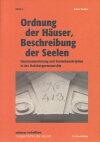Workshop Intermediaries in labour relations from pre-industrial societies to the XXth century, Brüssel 5.12.2008
Gestern über H-SOZ-U-KULT ausgeschickt: Das Programm des am 5.12.2008 in Brüssel stattfindenden Workshops Intermediaries in labour relations from pre-industrial societies to the XXth century. Ich werde dort einen Vortrag über Early Modern “Registry Offices” as Employment Agencies halten, mein Abstract lautet:
The early modern towns get still more confused, chaotic and complicated; it requires a number of difficult measures and facilities to make them usable for its inhabitants and for foreign visitors. One of these facilities are the so called “registry offices” or “address bureaus”, founded in the 17th and 18th century. The most fa-mous of them is Théophraste Renaudot’s Bureau d’adresse that exists in Paris from 1630 to 1643. In Lon-don Samuel Hartlib fails with his plan to found an Office of Publick Addresse, but his compagnon Henry Rob-inson succeeds in installing a short-lived Office of Address for Accomodations in 1650, followed by many other Offices of enteries, Offices of Intelligence or Places of Encounters. In the Habsburg Monarchy these bureaus are called Frag- und Kundschaftsämter, in German and Danish territories Adress-Comptoirs or Intel-ligenzbüros, in Switzerland Berichthäuser. Most of these offices publish their proper news papers; all act as intermediaries between supply and demand, as address and information brokers and take over some of the functions of traditional relation networks, such as employment agency, pawn shop, sales office or credit award.
In my paper I want to present first results of my “Habilitations-Projekt” funded by the Austrian FWF about the Early Modern registry offices in Europe; the aim of this project is to trace their different functions and to ask how successful registry offices were in professionalizing cultural every day-practices. One of my main thesis is that they can be regarded as precursors of today’s search engines. In my presentation I particulary want to stress the function of the registry offices as employment agencies competing with guilds and other traditional brokers of labour such as the so called “Zubringerinnen”, i.e. women who placed domestic ser-vants; I would also like to analyze the debate about the placement of women, which was very controversial.
#FragamtWien
The early modern towns get still more confused, chaotic and complicated; it requires a number of difficult measures and facilities to make them usable for its inhabitants and for foreign visitors. One of these facilities are the so called “registry offices” or “address bureaus”, founded in the 17th and 18th century. The most fa-mous of them is Théophraste Renaudot’s Bureau d’adresse that exists in Paris from 1630 to 1643. In Lon-don Samuel Hartlib fails with his plan to found an Office of Publick Addresse, but his compagnon Henry Rob-inson succeeds in installing a short-lived Office of Address for Accomodations in 1650, followed by many other Offices of enteries, Offices of Intelligence or Places of Encounters. In the Habsburg Monarchy these bureaus are called Frag- und Kundschaftsämter, in German and Danish territories Adress-Comptoirs or Intel-ligenzbüros, in Switzerland Berichthäuser. Most of these offices publish their proper news papers; all act as intermediaries between supply and demand, as address and information brokers and take over some of the functions of traditional relation networks, such as employment agency, pawn shop, sales office or credit award.
In my paper I want to present first results of my “Habilitations-Projekt” funded by the Austrian FWF about the Early Modern registry offices in Europe; the aim of this project is to trace their different functions and to ask how successful registry offices were in professionalizing cultural every day-practices. One of my main thesis is that they can be regarded as precursors of today’s search engines. In my presentation I particulary want to stress the function of the registry offices as employment agencies competing with guilds and other traditional brokers of labour such as the so called “Zubringerinnen”, i.e. women who placed domestic ser-vants; I would also like to analyze the debate about the placement of women, which was very controversial.
#FragamtWien
adresscomptoir -
Adressbueros - Di, 25. Nov. 2008, 08:30








